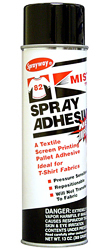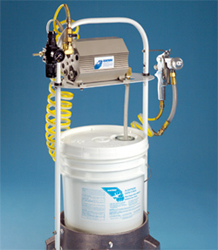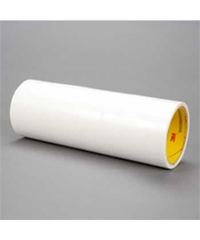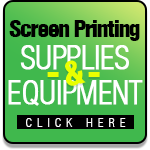Learn How To Screen Print With Catspit Productions, LLC
Pallet Adhesives For Screen Printing: Spray Tacks, Bulk, and Papers
Pallet adhesives are used on manual rotary screen printing presses as well as other types of presses in order to hold the garment in a fixed position during printing. Keeping the garment securely affixed to the pallet during printing will improve print quality as well as registration. In fact it is impossible to print a multi colored job without pallet adhesive to hold the shirt to the printing pallet. There are 3 basic types of pallet adhesives which are; spray tacks, bulk adhesives, and adhesive paper or sheets.
Which type of pallet adhesive you choose to use will really depend on the quantity of printing you are doing. For medium to high quantity printing, spray tacks are easy to use and cost effective. For very high volume printing in mass production situations a bulk adhesive will be much more economically practical. And finally for the lower end screen printer who is doing very low quantity printing, an adhesive paper roll or sheet may work just fine.
Any one of the 3 basic types of pallet adhesives may be used for any volume of printing. In the end it will come down to the preference of the printer and shop owner.
The following is a brief description of each of the types of screen printing pallet adhesives and their usages:
 Aerosol Spray Tacks - These are probably the most common of all pallet adhesives because they are very easy to use and store. The product will last forever inside the can and may be used efficiently in low quantity printing situations as well as high quantity printing. Aerosol spray tacks are also very versatile in that they come in a few different formulas which are specifically designed for certain printing applications.
Aerosol Spray Tacks - These are probably the most common of all pallet adhesives because they are very easy to use and store. The product will last forever inside the can and may be used efficiently in low quantity printing situations as well as high quantity printing. Aerosol spray tacks are also very versatile in that they come in a few different formulas which are specifically designed for certain printing applications.
There are flash tacks designed to be used with a flash cure unit and resist heat. Spray tacks also come in a web type spray which is well suited for fleece such as hoodies or sweatshirts. The standard type of aerosol spray tack is a mist. These products most often come in a metal aerosol cans containing about 14 to 16 ounces of product. The biggest drawback is the over spray of the adhesive product in the area of usage.
 Bulk Pallet Adhesives - These pallet adhesives are most often liquids of various thicknesses that are intended to either be manually applied to the pallet or sprayed onto the pallet using a compressed air delivery system. Manual applications may be by brush and bulk applications on automatic presses are often done by a pneumatic system in which compressed air is used as the propellant.
Bulk Pallet Adhesives - These pallet adhesives are most often liquids of various thicknesses that are intended to either be manually applied to the pallet or sprayed onto the pallet using a compressed air delivery system. Manual applications may be by brush and bulk applications on automatic presses are often done by a pneumatic system in which compressed air is used as the propellant.
These may also come in a variety of formulas depending on the manufacturer. This type of adhesive will often come in gallon and five gallon containers. The biggest drawback is the over spray of the adhesive product in the area of usage when applied by compressed air.
 Paper Roll or Sheet Adhesives - This is a type of pallet adhesive that is similar to pallet tape but it has adhesive on both sides. It's much like double sided or double stick tape. It may come in pre-cut sheets as well as rolls. This adhesive poses application and storage challenges. It is not the easiest to apply and it is not the best as far as storage longevity is concerned.
Paper Roll or Sheet Adhesives - This is a type of pallet adhesive that is similar to pallet tape but it has adhesive on both sides. It's much like double sided or double stick tape. It may come in pre-cut sheets as well as rolls. This adhesive poses application and storage challenges. It is not the easiest to apply and it is not the best as far as storage longevity is concerned.
This pallet adhesive may also become so fixed to the pallet that it can become very difficult to remove and replace. Much like using pallet tape, this adhesive is best when replaced on a regular schedule rather than waiting until it loses all of its stickiness.
For beginners and intermediates aerosol spray tacks are recommended for their long shelf life and ease of use. They are versatile and cost effective when used properly. The only drawback to aerosol spray tacks is that there is an overspray that may build up on the press itself and any closely surrounding items too.
Never keep screens and other items that need to remain clean near the pallet or press you are using spray tacks on. The over spray will not only build up on the press itself but it will also collect dust and dirt. Remember, it is important to keep your rotary screen printing press clean and well lubricated for best performance.


 Screenprinting Equipment From Catspit Productions
Screenprinting Equipment From Catspit Productions


